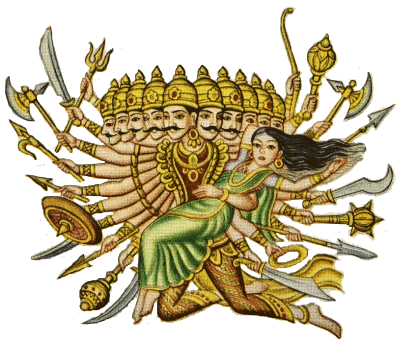
| Gods&Goddesses-1 | Gods&Goddesses-2 |

| Gods&Goddesses-1 | Gods&Goddesses-2 |
|
Gods & Goddesses |


|
MANU:
Impersonation
of
Krishna
as the ruler, father and legislator of humanity. There are
fourteen of them for each day of Brahmâ or kalpa.
Present Manu, the seventh: Srâddhadeva (also called
Vaivasvata) Writer of the Manu-samhitâ (the lawbook of
mankind written by Manu) |
|
![]()

Râkshasas
A certain kind of demons, the wild men, also called asuras:
a concept with a broader meaning indicating everyone not
complying
with the rules who are bent on enjoyment only.
Next to this are also the demons indicated who publicly oppose
religious principles and the malicious who fight against
Krishna.
Asura:
(lit.:
not of Surya, the sungod of sura, the light, enlightenment)
a godless one, a demon, someone going against the rules,
someone of darkness, an atheist, an unenlightened person
of desire driven by lust and anger. Anyone who does not follow
scriptural injunctions and whose only aim in life is to
constantly enjoy worldly pleasures.
Anyone who does not follow scriptural injunctions
and whose only aim in life is to constantly enjoy
worldly pleasures. Purely demonic being who publicly
opposes the principles of the religion. Malicious monster of the
kind
that with Krishna's stay on earth [see
SB, Canto
10]
fought against Him. Man-eaters.
![]()
|
|
Nâgas - snakes of heaven, inhabitants of Nâgaloka. (see also Ananta S'esha); they have a human face but a snakes body. Known snakes: Vasuki of the churning of the ocean on the back of Kurma and Tataksha, the snakebird that killed emperor Parîkchit at the end of the reading of the Bhâgavatam by S'uka. Also: Snakedevil - people with snakelike bodies or such a character - A cruel person - The air escaping with belching (one of the five airs of the body) - The best or most excellent of a sort. Ananta/Ananta S'esha/Anantadeva: Name for the divine snake with the countless heads on which he carries the universe; the snakebed on which Vishnu reclines. (see also SB 5.25) & SB: 1:11-11, SB: 2:6-13, SB: 4:1-22, SB: 5:21-18, SB: 11:12-3,6.) |
|
Yakshas & Yakshinis: The treasure keepers, attendants of Kuvera, the keepers of wealth, semi-divine beings sometimes considered as ghosts and spirits of demoniac possession. |
|
Kuvera: 'The treasurer of the demigods' - There is mention of Kuvera in several cantos of the Bhâgavata Purâna. See for example: 1:9-3, 2:7-33, 4:11-24, 4:15-14, 5:10-17, 9:2-32, 10:10, 10:34-25, 11:16-16. |
|
|
|
Kâr(t)tikeya (Guha, Skanda): The younger son of Lord S'iva and His consort Pârvatî; the presiding deity of warfare (riding a peacock) [SB: 10:51-16] |
|
Vrikshadevatas (or Tree-goddesses): From them it is said, that they kick against trees, to express symbolically that nature should be incited to procreate. & below them: Apsaras: Heavenly dancing girls, denizens of heaven. Wives of the Gandharvas (the supreme heavenly singers).
|
|
|
|
Kinnaras: the ones of superpower said to be capable of changing their form at will. [see S.B.: 7.8: 55)
|
|
Durgâ: Goddess; Heartens the struggle for material interests of mahâmâyâ ('the great illusion' - the bewildering potency of the material world). The impersonation of the material energy and the spouse of Lord S'iva. She is elegant and feminine as Pârvatî or Uma, but as Durgâ she is cruel and as Kâlî she is bloodthirsty (see Kâlî). (see also Uma) |
|
|
|
Usha or Ushas (= 'shine' or 'east'): Goddess of daybreak on her cart, pulled by seven cows, from them it is said that they represent the seven days of the week. |
|
Râvana abducting Sîtâ: A mighty demon called 'ten-head', who wanted to build a staircase to heaven and pave the streets with gold, but by Krishna in His Râma- incarnation was killed after he had abducted Sîtâ [see: Ramakatha Rasavahini, chapter 3a&3b The Wily Villain] and also S'rîmad Bhâgavatam: 9-10, 9-15, 10-40, 11-4, 11-12 & (2-7, 4-1, 5-19, 5-24, 7-1, 7-10). Hanumân: Monkey-god who led Lord Râma's vanâras (ape-like) in the battle against the demon Râvana. He is carried in the banner of Arjuna as a sign of victory. [see: Ramakatha Rasavahini, chapter 5b: Success in the Search] (See also the prayer of Hanumân SB: 5-19, and the SB. Râma-chapters: 9: 10 & 11). |
 |
|
|
Kâlî: Goddess unto whom meat-eaters perform their sacrifices. (see also Durgâ) [Kali-yuga: (iron age) era of quarrel and strife that commenced after Krishna's departure 5000 years ago, eighteenth of February 3102 B.C, and is characterized by the four human weaknesses that form the opposite of the four religious virtues, the four legs of the bull of dharma (sauca, tapah, dayâ, satya): free sex, gambling, eating of meat and intoxication as opposed to purity, sobriety, compassion and truthfulness: the regulative principles. (see also SB: 5.6: 10, 5-9, (Bhadrâ Kâlî), 1.16 & 17). - The faithful ones [of spiritual progress] knowing of the value, praise the age of Kali pointing out it's essence that by [mere] congregational chanting as good as all one's goals are attained (11.5: 36). - To this S'rî Caitanya Mahâprabhu qouted a verse from the Brahma-vaivarta Purâna:
"In this
age of Kali, five acts are forbidden: the offering of a
horse in sacrifice, the offering of a cow in sacrifice, the
acceptance of the order of sannyâsa, the offering of
oblations of flesh to the forefathers, and a man's begetting
children in his brother's wife."] |

Sources:
S'rîmad
Bhâgavatam -
'The Story of the Fortunate One' - (Bhagavata Purâna)
&
The Vahinis
by Bhagavân S'rî Sathya Sai Baba
Midi-files on this page by The Order of Time
N.B. If you want to use any of these images on your own website,
please put them on your own server too. Do not steal any bandwidth.